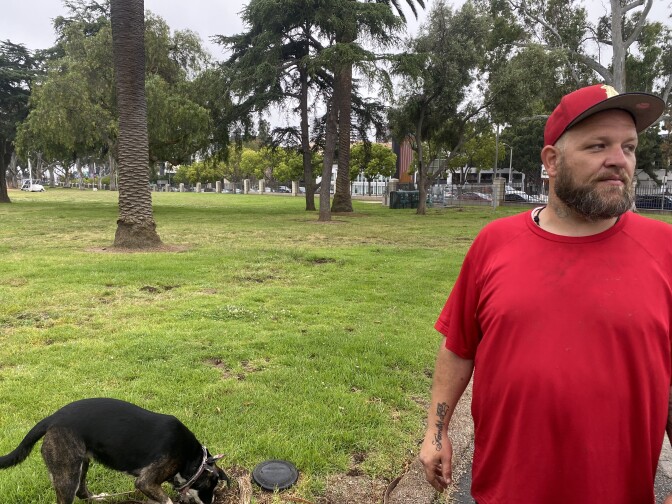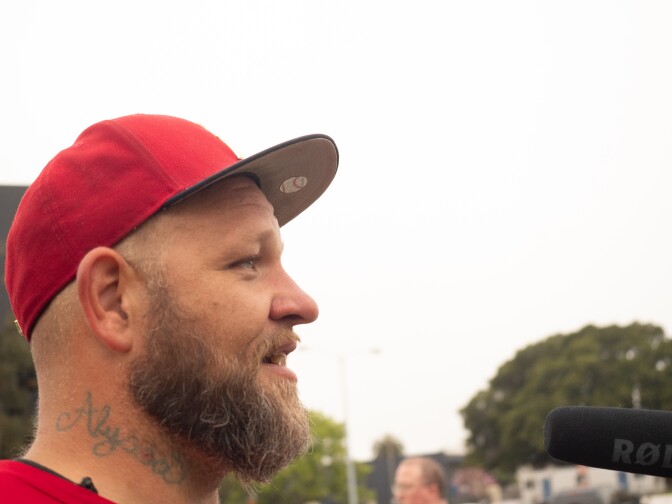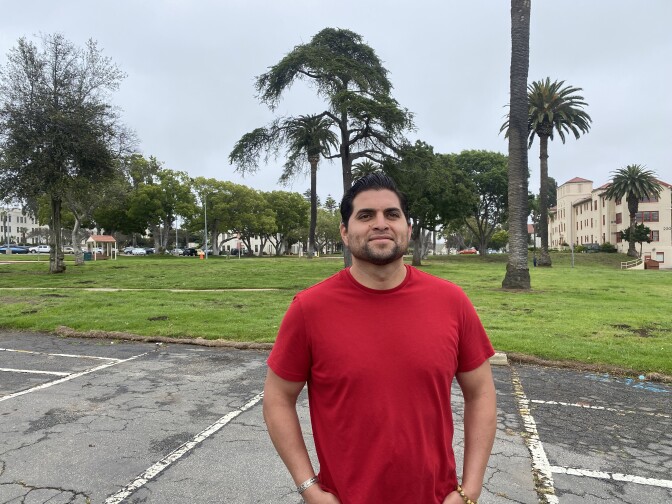This story is free to read because readers choose to support LAist. If you find value in independent local reporting, make a donation to power our newsroom today.
LA's Veterans Fight To Secure Housing: 'It Took Me 10 Years To Get Here'

At the West Los Angeles Veterans Affairs campus, Army veteran Josh Petit gestures toward a cluster of about 50 “tiny homes” that sit on an unpaved chunk of land on the 387-acre expanse.
They’re cramped but, says Petit, “I think it’s a blessing compared to what was here before, which was nothing.”
Petit, a 6-foot-2 vet who served in Iraq, struggled with substance abuse for many years and has been in and out of homelessness for nearly two decades. He’s now sober and recently moved into one of these small 8-by-8 foot dwellings on campus.
Petit says the showers are ice cold and the toilet and sink are so close he can hardly sit down. But after living in a tent encampment in front of the VA — known as Veterans Row on San Vicente Boulevard — he says this is a welcome step up.
“I was infantry in the Army. I’m used to being in the mud, in the muck,” he explains. “Gimme a place with electricity and an AC, I'll sit in there and be happy with it.”
The 'homeless veterans capital of the country'
Nearly 4,000 U.S. veterans live without permanent housing in L.A. County, according to a 2022 report by the Los Angeles Homeless Services Authority. Once deemed the “homeless veterans capital of the country,” L.A. has had more unhoused veterans than any city in America.
Red tape and an overly complex administrative process paired with years of illegal mismanagement of the West Los Angeles VA land have left those who have served our country forced to wage a new battle to secure housing and benefits when they finally return home.
Like so many other veterans, Petit, 42, has lived through years of instability, fighting for promised benefits through the VA since his return from war. “I've met many veterans out here that had devastating things happen to them,” Petit says.

The tiny homes where Petit now lives were constructed in 2021 as a quick fix for moving people out of Veterans Row. They were always meant to be temporary, but most veterans in the dwellings have no idea when — or if — they will qualify for permanent housing. And even if they did, they would have to trudge through seemingly endless paperwork, office visits and an application process that could last years. For some, it never ends.
“You have instances where people are sitting for a year in a tiny home when they should already be in housing,” said Rob Reynolds, an advocate for unhoused veterans.
Reynolds, who served in Iraq and was unhoused himself for some time after he was discharged, says he’s most concerned about veterans who are severely disabled or suffering from mental health issues and can’t advocate for themselves.
“This work has been absolutely taxing and frustrating,” he says about his daily mission to get services for veterans. “It takes so much to get very small things accomplished.”
Apartments behind schedule … and unfilled
In May, the VA opened up 233 units in three newly renovated buildings to house veterans on the massive West L.A. campus, operated by the Veterans Health Administration and the Department of Veterans Affairs. The new apartments are a response to a 2011 lawsuit alleging the VA was illegally renting the land to private interests and not delivering on its mandate to house veterans.
But the VA is running about four years behind schedule and hundreds of units short on that promise. (By 2022, the VA was supposed to have built 770 units). And still many of the new apartments that are available remain empty because of all the bureaucracy laid out above.
“There’re many roadblocks for a lot of us,” Petit says. “If the VA had been doing what they should have been doing, none of this would have happened.”

West L.A. campus
For years, the West L.A. campus — gifted to the VA in the 1800s to house former soldiers — has been riddled with controversy. There was the 2011 lawsuit after which a judge ruled the VA misused the campus by leasing land for hotel laundry, a film studio storage lot and UCLA’s baseball stadium. In 2018, a VA employee pleaded guilty to taking bribes from a private parking lot company that was leasing land at the campus. In 2021, a VA office Inspector General report found that many of the leases on campus were in violation of the VA’s legal obligation to house and support veterans.
“The VA catered to those entities over veterans' needs,” says Rob Reynolds.
And last November, 14 veterans filed another suit demanding the VA speed up the renovation of the abandoned buildings that have long dotted the massive landscape and stick to its promised timeline for the new units.
“The phrase ‘homeless veteran’ should be an American oxymoron,” the lawsuit states. “But this is the cruel truth — the federal government consistently refuses to keep its word and take meaningful actions to bring the abomination of veteran homelessness to an end. The VA remains a principal cause of continuing homelessness among veterans.”
In response to questions about the delays, the VA has cited environmental impact studies, the need for infrastructure upgrades and lack of funding to complete the construction.
“Would we have liked to build these units sooner?” says John Kuhn, Deputy Medical Center Director of the VA Greater Los Angeles Healthcare System. “Of course, everyone is interested in getting as much housing developed as fast as possible.”
The roadblocks
Beyond building delays, getting approved to live in these units can be a challenge. Missing or incorrect details in any of the paperwork can disqualify veterans, requiring them to restart the process all over again.
Veterans who are “severely mentally ill, severely disabled … will show up here, have no identification, no paperwork, and then they have to go through this whole process again that can take three to six months,” Reynolds says.
Perhaps the most frustrating roadblock is the issue of income limit restrictions. Many veterans struggling with mental or physical health issues receive disability compensation that exceeds the Area Median Income for affordable housing, disqualifying them from many units reserved for veterans.
“So the cruel irony here is that the most disabled veterans — the ones that would benefit the most from living at the VA — are being told they can't live at the VA,” Reynolds says.
Veterans and their advocates say a lack of direct communication between local officials, like L.A. Mayor Karen Bass, and veterans themselves has delayed the process further.
But Bass says she is committed to getting vets housed.
“I have been very much involved in these issues along with other categories of homeless people as well,” Bass told LAist. “In terms of speeding up the building, I've been very dismayed by that. If we can get the flexibility in some of the rules, we will be able to house a lot more.”
Bass also said she is currently working at the federal level to push the U.S. Department of Housing and Urban Development to shift these policies regarding income caps and consider veterans’ specific needs.
Still, veterans say they don’t feel heard.
“Just talk to us,” Josh Petit said. “I mean, we’re veterans, if we don’t bond with you, we’re not gonna work with you.”
Edward’s story
“I fought in Afghanistan, I’m 70% disabled,” says Edward Sotelo, a formerly unhoused veteran now living on the West L.A. VA campus. “Why should I have to fight for my service connection back here?”
Sotelo, 36, recalls waiting three months for a first appointment with the VA a number of times. With no luck getting benefits, he alternated between crashing on friends’ couches and living on the streets after he was discharged from Afghanistan more than a decade ago.

Eventually, he got into a VA rehabilitation program that helped him stay sober long enough to get the housing application filed correctly. But injuries Sotelo sustained in Afghanistan rendered him 70% disabled — he now says he struggles with PTSD and a traumatic brain injury — and his disability payments put him above most of the income caps on the new units at the West L.A. VA.
“I had lost hope at that time period,” he says. “I honestly thought what I was going through was a life sentence.”
But in May, after an excruciating, decade-long journey — the paperwork, bouncing between agencies, waiting years to get into rehab and therapy to stay sober — Sotelo finally found an apartment on campus he qualified for, only after the income limit was lifted. He now has keys to his own place.
Along with high-quality amenities in the apartment, which are “beautiful and modern,” Sotelo says, he’s also taking college courses at Santa Monica College and is enrolled in therapy through VA benefits.
“There are miracles that can happen within this space,” he says, his eyes lighting up. “But I had to go find it all myself. What about the guys out there that can't do that? Who are not able to protect themselves?”
‘Any day now, I’m hoping’
As for Iraq vet Josh Petit, he’s still waiting for his turn to move into one of the new permanent units on campus. He’s been living in his tiny home for more than a year and a half.
“My mental health has been greatly improved, from where I was out on San Vicente sticking a needle in my arm,” he says. “It’s not what we deserve, but it’s a step up from the tents.”
He says having his own shower, even a tiny one hovering over the sink, helps him to maintain his hygiene. This allows him to regularly see his family, including his 17-year-old daughter. “I just don’t want to lose my family,” he says, tearfully.
Whether or not he will soon be transferred into one of the newly constructed units as promised remains unknown.
“They said I’m in one of the new buildings,” he tells us. “So any day now, I’m hoping.”
Corrected July 17, 2023 at 12:12 PM PDT
An earlier version of this story misidentified Rob Reynolds as an Afghanistan vet. He is an Iraq vet.








